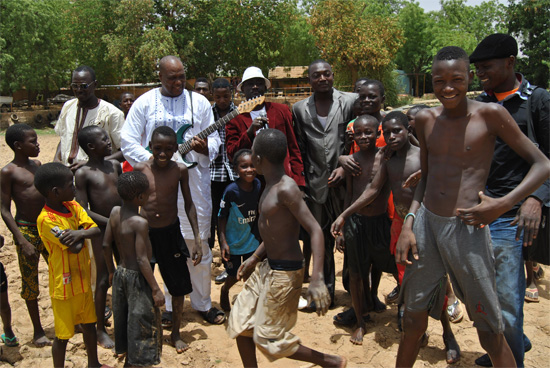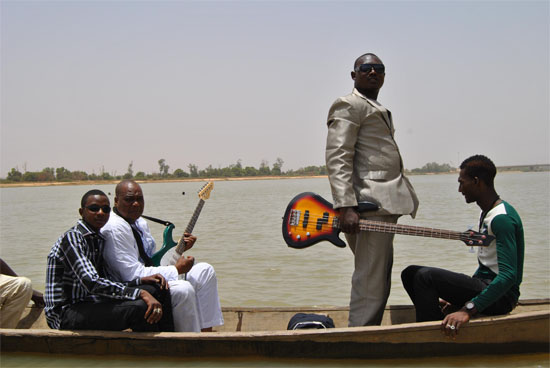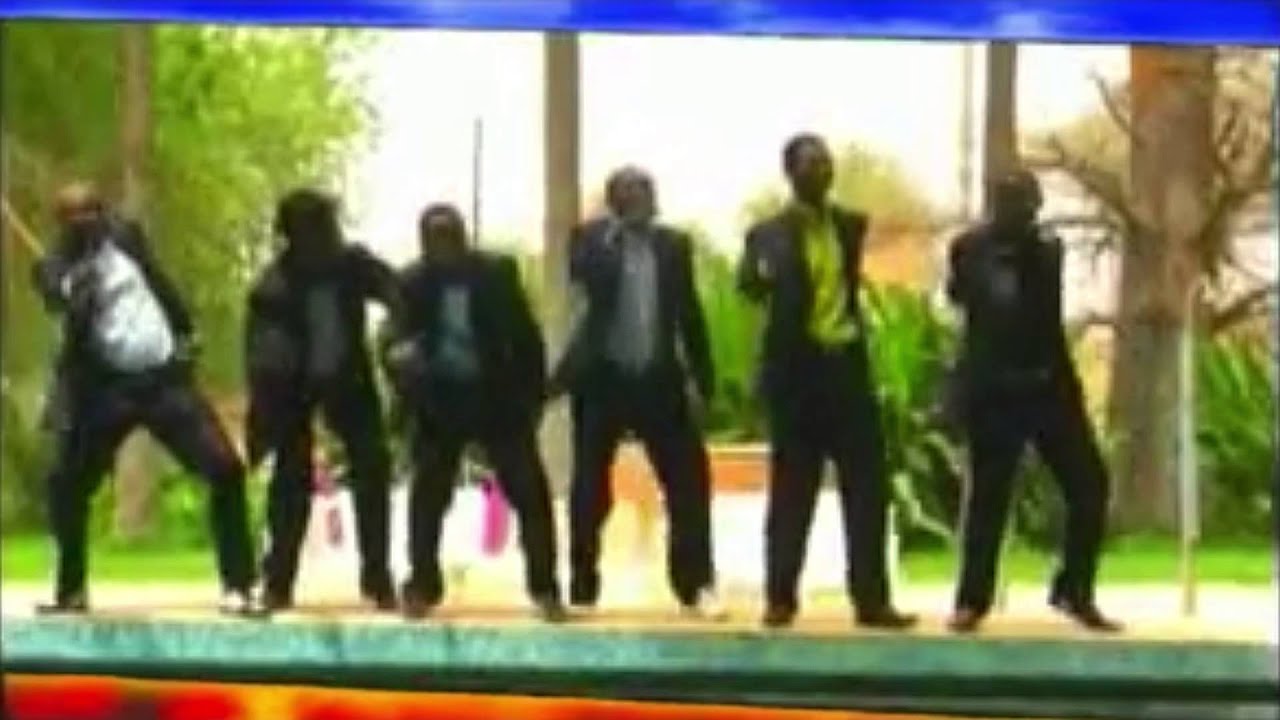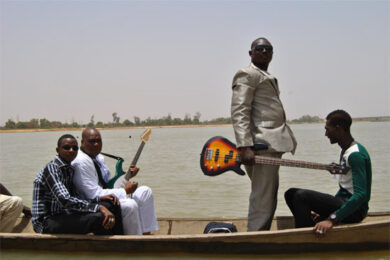Over the last decade Tal National have established themselves as the band to see in Niger, blurring the boundaries between musicians and audience as they dance together long into the night. The large ensemble numbers up to thirteen members and, during five-hour plus sets, five nights a week in their homeland, the group are known to swap instruments mid-song and create a wild party atmosphere until the sun sets. The music is a rush of complex guitar lines laid over propulsive and hypnotic percussion – Afro-rock with a Battles-like intensity, as relentless riffs batter away into your subconscious.
One of Niger’s best loved groups, the group are also a hit on Nigerien TV and their videos on YouTube have captured the attention of a still-wider audience. They’ve stepped out into the wider world with their recent album Kaani, their first international release on FatCat. Understandably the eight tracks on Kaani have been trimmed to fit the LP format, but they still capture the effect of the extended, trance-inducing sets the group are known for playing at home.
Tal National formed in 2000 and released their debut album Apokte in 2006. For 2008 follow-up A-na Waya, the group sought a more powerful sound, and recruited Chicago-based recording engineer Jamie Carter who brought his own equipment to their Studio Maibianigarba. With a lack of decent recording facilities in Niger, it made more sense for the group to fly Carter over than to collectively travel to studios in Nigeria or Ghana. And he was back in January 2011 to record the tracks that make up Kaani, with the group recording by day before heading out in the evening for their nightly gigs.
Tal National hail from Niamey, capital of west Africa’s largest country, and they have expanded their fanbase across the land thanks to annual tours taking in more than 40 cities. With no national music distribution system, the group have taken a DIY approach to getting their music out to people, by selling CDs to passing drivers at roundabouts as soon as they are pressed, in a bid to beat bootleggers. The former French colony’s diverse Songhai, Fulani, Hausa and Tuareg populations are represented in the group, reflecting Niger’s status as a cultural crossroads on ancient trade routes. Their fresh and distinctly modern music brims with that diversity: the influence of Tuareg desert rock and Hausa’s Fuji head-spinning 12/8 percussive polyrhythms are combined with Saharan, highlife and west African traditional folk styles.
The group are led by enigmatic guitar player and former professional footballer Hamadal ‘Almeida’ Issoufou Moumine. Outside music, Almeida works as a judge in local courts and with children at one of the country’s three SOS Children’s Villages. The villages were set up to support children, many of whom are orphans due to the socioeconomic effects of drought devastating crops and livestock, and offers an alternative to mining or begging. Almeida took time out from preparing for the group’s upcoming north American tour to answer the Quietus’ questions by email.
I understand you were a footballer. Tell us about your playing career, and how you came to be a musician?
Hamadal Issoufou Moumine: I was a football player from 1990 to 1997. I started as a forward in a team in Zinder, east of Niger. Then I became a defender in Niamey, in the famous team called Sahel Sporting Club. [But] when I turned 30 I realised I was getting too old to become famous in football, so I started to focus more on music. Then I became a famous musician in Niger and West Africa.
How did Tal National come together? Give us a brief history.
HIM: I started the band in 2000, and there are only three original members left. Over the years we have helped to develop many musicians to be better players and singers. A lot of the time they get offered more money to play in other bands, but they never become as successful as in Tal National. We have put out three albums, and with each one we become more popular. Our opportunities continue to grow, and we also try to keep pushing our sound.
How did the making of the new album compare to your previous releases? How did producer Jamie Carter get involved and what did he bring to the process?
HIM: I met Jamie in Chicago in 2008. I went to his recording studio, and recorded a song with some friends while I was participating in the Chicago Calling Arts Festival. I liked how he worked, so I proposed to him that I would fly him to Niger and pay for his expenses if he would record my band. He accepted, and since then we have made two records together (A-na Waya and Kaani). Sonically I think Kaani is similar to A-na Waya. They were both recorded in the same studio, using similar equipment. I think the musicianship and the songwriting really improved between the two albums. A-na Waya made us a much more popular band in Niger, and we had more performance opportunities because of that. That helped our musicianship improve.
We recorded A-na Waya in three days, it was a fast process and was new to us all. With Kaani, thanks to a Kickstarter campaign, Jamie was able to spend three weeks in Niamey, and most of that time was spent with us in the studio. The days were more relaxed, we were able to write some new songs in the studio, and make sure our takes were how we wanted them, without being rushed.
Jamie was able to capture Tal National playing as Tal National. In Niamey, there are recording studios, but they can only record one instrument at a time. Jamie was able to bring equipment that allowed us to all record at the same time, and I think this helped to document the energy of the band. When we play we have a lot of different musical cues that indicate changes, and there is a playfulness in the musicianship that makes us able to inspire and push each other in our performances. I think that comes through in the recordings.

With no distribution system for music in Niger, how did you release your previous recordings?
HIM: We sell our CDs, cassettes and DVDs by ourselves. We take two days to sell in Niamey at every major roundabout. After two days we give the rest to local traders who can sell them. We have a small window of time to sell our music, because as soon as we start selling it, it becomes pirated and you can buy it everywhere. We try to stamp the official products (the stamp on the bottom left of Kaani is based off of this stamp) to show people which is authentic, but some people don’t care, they just want to hear Tal National any way they can!
Although well known in Niger, when did you start to realise there was an awareness of your music elsewhere in the world?
HIM: For our album A-na Waya we made a DVD that had music videos for songs from that album. We gave Jamie Carter one of the DVDs, and he uploaded three videos to YouTube in the US. When he came back in 2011 he showed us how many views the videos had, and it was great to see. Now many people have uploaded Tal National videos. Tal National is famous on YouTube because of our style of performing and because our music has rock & roll energy. When you hear Tal National, you’ll dance because of the rhythm. Also, the melodies in our songs are very easy, even children can sing them.
How did the opportunity to sign for FatCat come about?
HIM: Our music found its way to Derek Becker in Chicago, who is a booking agent. He championed the band and was very helpful in promoting the band to people within the music industry. When we started to put our first US tour together, we realised it was time to find a label that could help promote the band and the new album Kaani. FatCat were immediately interested and have been very supportive.
What is it like touring back home, and is it common for groups to do such big tours?
HIM: We do tours by bus, pick-up and 4×4. At the moment we are the only band in Niger that tours like this. It works for Tal National, because everybody likes our songs and we don’t sing for politicians, we just put on a good show. Most of the tours are with another non-musical group. Maybe a company promoting their product, or maybe a government organisation promoting sending children to school. We have toured Agadez, in the north, and because our music doesn’t have a political agenda, we aren’t too concerned about insecurity – everybody likes our shows.
You are known for playing lengthy sets that go on until dawn in Niger. How will this compare to gigs on the upcoming tour of the US and Canada?
HIM: We expect the shows in the US to be very different! In Niamey, hundreds of people dance to our music every night. The stage is just a part of the dancefloor, so when a lot of people are dancing, they start to dance in the same place that we are performing, and the band and audience become one. We provide the music from the time the venue opens until it is closed, so while people appreciate the music, the presentation is a lot different than just playing for one hour. Maybe we can bring some of the Niamey experience to the US, and have the people dancing on stage with us?
Some of the gigs were cancelled due to visa issues, can you comment on that?
HIM: It has been a very complicated process for us in Niger. A lot of the process is done on the internet, and it can be hard to understand the correct way to do everything. On top of that, we had a very small time frame to undertake this process, which coincided with the authority at the US Emabassy in Niamey being out of the office for two weeks! We had the generous support of senators in the US, and we tried everything we could to make it for all the shows, but unfortunately we did have to cancel some shows.
Outside of the band I understand you work as a teacher at a SOS Children’s Village – how important is the work they do in providing education and care for these youngsters?
HIM: Teaching at SOS is important because we haven’t developed art education in Niger, so I try to do it at the SOS Village for orphaned children. Art learning in this centre can help the children to live together, to build new personalities and become good citizens.
What other touring plans do you have? Can we expect to see you in the UK?
HIM: Touring in UK would be a great thing for Tal National. It can help people to learn more about Nigerien culture, help them have new experiences with different people.
Tal National’s Kaani is out now via FatCat




